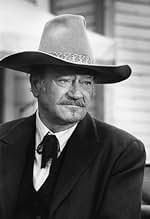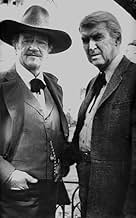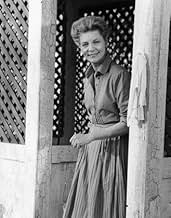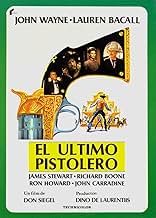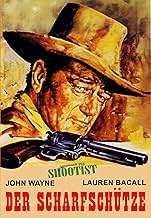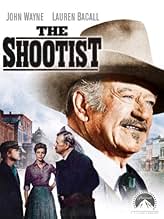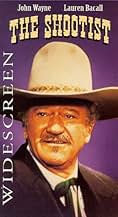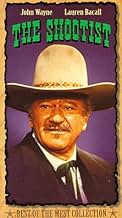Um pistoleiro moribundo passa seus últimos dias procurando uma maneira de morrer com um mínimo de dor e um máximo de dignidade.Um pistoleiro moribundo passa seus últimos dias procurando uma maneira de morrer com um mínimo de dor e um máximo de dignidade.Um pistoleiro moribundo passa seus últimos dias procurando uma maneira de morrer com um mínimo de dor e um máximo de dignidade.
- Direção
- Roteiristas
- Artistas
- Indicado a 1 Oscar
- 1 vitória e 5 indicações no total
- Girl on Streetcar
- (as Melody Thomas)
- Man Outside Metropole
- (não creditado)
- Direção
- Roteiristas
- Elenco e equipe completos
- Produção, bilheteria e muito mais no IMDbPro
Avaliações em destaque
The film is a particularly appropriate one for Wayne's last picture. The protagonist he plays is a man at the top of his profession with nowhere left to go. Any opponent who has ever fought him has died at the end of Books' barrel; but now, he is fighting an enemy he cannot hope to face and beat like a man. Whatever he does to fight the cancer, it will just take him anyway. And so, Books searches for a way to go down fighting and to die with dignity, not dying a slow crippling death in his bed.
Books is a character that has many faults. He is a man who has killed thirty men and shows no remorse. As he puts it himself, `I never killed a man who didn't deserve it'. However, despite all his faults, he shows himself to a gentleman of the old school. He is like a knight in armour transplanted to the last days of the Wild West, trying hard to keep all the old values of a dignity and honour alive. He is a man who lives by a code which he believes in, and which he applies to others: `I won't be wronged, I won't be insulted, and I won't be laid a hand on. I don't do these things to other people, and I require the same from them.'
There is no real villain in this film. Books, with all his flaws, is not a bad man. The real villains here are the ordinary people who are all around him in the city, willing to exploit him and use his fame, illness and even his death to further their own wealth. The whole town, from reporters to undertakers, are only too eager to exploit him, with only a few good people being an exception to this tragic rule.
There is no mistaking that this is the Duke's final picture, and not anybody else's film. It is his persona and his charisma that carries and controls the film. The character of Books a rough, tough, but by no means bad, man is very much similar to that of Wayne's own and this film is essentially a vehicle allowing him to have a dramatic swansong befitting a star of his magnitude.
That isn't to say, however, that the others involved with this don't pull their weight. Lauren Bacall delivers well up to her usual standard of acting, presenting a character both strong-spirited and tenderly gentle at once, something which she does extremely well. Ron Howard also acquits himself admirably as her son, turning in a performance which has the same strength and heart as that of his screen-mother Bacall. James Stewart turns in a powerful cameo, adding to the overall poignancy of the whole affair, and Harry Morgan turns in a repellent performance as the contemptible Marshal Thibado. Dirty Harry director Don Seigel directs with skill and ensures that the film remains poignant, but never sentimental. For a western, this film does not have a great deal of action, but such is the quality of acting, direction and scriptwriting, that this doesn't really matter. When the violence does erupt, however, it is occasionally graphic but always exciting. The film's climactic gunfight is a particular highlight and is one of the Duke's best shoot-outs.
This is a powerful, entertaining and enjoyable film, regardless; however, it is further ennobled by it being the Duke's final performance. There is something curiously heart-warming about the whole affair, not least the fact that he is enabled to go out in such great style. This is a must for fans of the western genre, for fans of the Duke, or for anyone who just wants to see a well made, poignant film. Highly recommended. [8]
After a brief prologue made up of film clips of Wayne in his career prime, we meet his cinematic alter ego, John Bernard Books, an aging gunfighter who rides into Carson City, Nevada in the early 1900's looking for Doc Hostetler (James Stewart), the old sawbones who once saved his life and apparently the only man he trusts. It seems the old guy has prostate cancer and only a few weeks to live, and as Hostetler tells him, it will not be a pleasant death. Books, with no where else to go, checks into Bond Rogers' (Lauren Bacall) boarding house to live out his final days in peace under the alias "William Hickok." When Bond's delinquent son Gillom (Ron Howard, in a nice change-of-pace performance and his last major film appearance before becoming a director) informs her of his true identity, she tries to throw him out but relents when she finds out his condition and agrees to help him die in peace.
Unfortunately, things don't go as planned as everyone from the town mortician (John Carradine) to an old girlfriend (Sheree North) to a newspaper editor (Richard Lenz) try to take advantage of his situation and turn a fast buck. And then there are several lowlifes (Richard Boone, Hugh O'Brien, Bill McKinney, etc.) who want to seal their reputations by taking him out. Since it's obvious that no one will leave him alone in his final days, and since he grows fond (to put it mildly) of both Bond and Gillom and wishes them no harm, Books decides to go out in style and on his own terms, and to take a few scumbags along with him.
"The Shootist" is one of those rare films that seems to have gotten better with age. It wasn't particularly successful with critics or audiences at the time, as they were apparently put off by its leisurely pace and relative lack of action. Typical of the reaction was a TV guide critic (who shall remain nameless), who once derided it and its stars as coming across as "relics of the old West." (Wasn't that the point?) However, it is now pretty much considered a classic, and rightfully so, especially when viewed next to some of the lesser films of Wayne's 1970's period ("Cahill," "Rooster Cogburn," "The Cowboys"). In fact, it is now hard to believe that Wayne was not nominated for an Oscar here, as Books is clearly one of the best performances of his career and definitely eclipses his extravagantly praised, Oscar-winning mugging in "True Grit." Indeed, "The Shootist" deserves to stand alongside Clint Eastwood's "The Outlaw Josey Wales" and Oscar-winning "Unforgiven" as the last three great Westerns in cinema history. Everything about it is immaculate--the sets, the costumes, the supporting cast (including Harry Morgan in a terrific cameo as an unsympathetic sheriff who tells Books, "What I put on your grave won't pass for roses."), the script, and the chemistry between Wayne and Bacall, teaming up for the first time since "Blood Alley." And everything is held together by old pro director Donald Siegel who, aside from the late Hal Ashby, may very well be the most underappreciated director in cinema history.
But "The Shootist" is John Wayne's film all the way. He is simply sensational, and BRAVE, since he apparently knew at the time his cancer was back and that this would probably be his last film. It's not every film legend who gets to end his/her career on a high note, but Wayne did just that. I just hope he knew it before his death barely three years later. ****1/2 (out of *****)
At the period in which this film is set, gunslingers or `shootists' were soon to go the way of the horse and buggy. The queen (Victoria) had just died. Electricity, modern plumbing, modern commerce, modern transportation, and creature comforts were beginning to take over (check out the electric ceiling fans and mosaic tiles in the saloon!). Forward to real life'. It is 1976. One by one, the mythic legends created by dime novels and Hollywood movies are being demystified. From Billy The Kid to Buffalo Bill, to Bonnie and Clyde, audiences have been shown for over decade how legends have always been manufactured. There are some who may see this demystification as a negative thing, but when people start adoring soldiers, celebrities and gangsters as something more than human, it's time to set the record straight. That's what all the best films of the seventies did. They broke the myths but they did not break the spirit, for what they did was let US, not the supermen on the screen, become the heroes. We could be afraid, old, young, ill, or weak, and we could feel pain and humiliation. In the process of confronting our limitations we become stronger. To be a stronger human being is to become civilized. Like this film shows us, we CAN reject the gun and join civilization. This film is John Wayne's gift to us. He is enabling us to grow up, to look at the past with respect, but to face the future with responsibility. His John Books is worth more to us than all his superheroes put together. We're all gonna die, we're all afraid, and pain is very, very real. It is in the process of surrendering to this fact with dignity and humility that we in a sense become immortal. To try to live as a superman is to die a fool. Only cowards (and very dangerous people) embrace myths over reality. That dainty red pillow has made The Duke sit very tall in his saddle indeed!
The film is about both endings and new beginnings, so it is significant that the action takes place in the first month of a new century. January 1901 marked not only the beginning of a century, but also the end of an era, because it was the month in which Queen Victoria died; this event is referred to several times in the film. The days of the `Old West' were also coming to an end; under the influence of new inventions such as the motor car and the telephone (both of which appear in the film) it was becoming a quieter and less lawless place.
The time of year is significant in another way. A film which is about both the end of a man's life and the end of an era will inevitably be elegiac in tone, and the standard way of making it would be to film it in autumn, with plenty of shots of falling leaves and grey, misty skies. Don Siegel, however, takes an alternative approach, setting the film during a brief period of brilliant winter sunshine and mild weather known as a `false spring'. This not only provides some strikingly beautiful images, but also has a double symbolic meaning. For Books and for the Old West it is winter; but for the younger generation, spring is coming. One of the most touching features of the film is the relationship between Books and Gillom, the son of his landlady. Gillom idolises Books and treats him as a hero; Books, in the last days of his life, treats the young man as the son he never had and tries to teach him that there is a better way than that of the gun. The Old West may be passing into history, but there are indications that the New West, although it may be less picturesque, will be a better place in which to live. If winter comes, can spring be far behind?
The film itself also turned out to mark the end of an era in more ways than one. Although there is some doubt whether Wayne actually knew in 1976 that his cancer had returned, we now of course know that it was to be his last film and that he was to die about three years later, and this knowledge makes the film all the more poignant. It was also one of the last of the great Westerns. Although the genre had seemed in reasonable health in the early seventies, it was to suffer, for various reasons, a sharp decline in the second half of the decade and throughout the eighties. Perhaps the standard conventions of the genre had become so familiar that they seemed like clichés; perhaps the post-Vietnam generation had no time for films which often had as their themes honour, glory and courage. (It is notable that the patriotic war film underwent a similar decline at the same time). Certainly, the financial failure of `Heaven's Gate' made investors wary of backing westerns. Even Clint Eastwood, who had seemed to be the heir-apparent to Wayne's crown as King (or should that be Duke?) of the West, abandoned the genre for a time, although he was to return to it triumphantly with `Unforgiven' in the early nineties.
Wayne's great strength as an actor was his ability to convey the tough but honourable man of action. Both these qualities are present in `The Shootist', but he was able to add further qualities, pathos and as sense of a less honourable past. Although Books is hard-bitten and irascible, he is also fundamentally decent, resorting to force only in self-defence. He can show pity- early in the film he spares the life of a villain who tries to rob him at gunpoint, even though he has the man at his mercy. Nevertheless, we are always well aware that he did not gain his fearsome reputation by a scrupulous observance of the Ten Commandments; although this is not an overtly religious film, the story of his last days can be seen as the story of his search for atonement as well as for dignity. In his last film, Wayne achieves one of his greatest performances; it is remarkable that he was not even nominated for an Oscar.
The other performance that stands out is that of Ron Howard as Gillom. Howard, of course, is now best known as a director; if his acting career is remembered it is for his role that bland TV series `Happy Days'. Nevertheless, he was also capable of giving good contributions in films (`American Graffiti' is another example), and here he brings a touching youthful innocence to the part. There are also good contributions from James Stewart as the gentle, dignified doctor and from Lauren Bacall as Gillom's mother. (She has the unusual Christian name Bond, possibly symbolic of the close ties that grow between her and Books at the end of his life).
`The Shootist' is a marvellous film, sombre and elegiac, and yet at the same time with a message of hope. A fitting end to Wayne's career. 9/10.
Você sabia?
- CuriosidadesJames Stewart agreed to play a cameo role in the film only because John Wayne had specifically requested him. His brief screen time proved to be rather difficult. The bad acoustics of the huge, hollow sound stages worsened his hearing difficulties, and he stayed by himself most of the time. He and Wayne muffed their lines so often in the main scene between them that director Don Siegel accused them of not trying hard enough. Wayne's reply was a variation on an old John Ford line, advising the director, "If you'd like the scene done better, you'd better get a couple of better actors." Later on, the star told friends that Stewart had known his lines, but hadn't been able to hear his cues, and that in turn had caused his own fumbling.
- Erros de gravaçãoBooks' hair (John Wayne's toupee) goes from being parted on his left to his right then back to his left after he tells Marshal Thibido he's a dying man when they first talk in Books' room.
- Citações
Gillom Rogers: [first lines, voiceover] His name was J.B. Books, and he had a matching pair of 45's with antique ivory grips that were something to behold. He wasn't an outlaw. The fact is for a while he was a lawman. Long before I met Mr. Books, he was a famous man. I guess his fame was why somebody or other was always after him. The wild country had taught him to survive. He lived his life and herded by himself. He had a credo that went:
John Bernard Books: I won't be wronged, I won't be insulted, and I won't be laid a hand on. I don't do these things to other people, and I require the same from them.
- ConexõesFeatured in Sneak Previews: The Top Ten Films of 1976 (1977)
- Trilhas sonorasWillow, Tit Willow
Music by Arthur Sullivan
Lyrics by W.S. Gilbert
Performed by John Wayne & Lauren Bacall
Principais escolhas
- How long is The Shootist?Fornecido pela Alexa
Detalhes
- Data de lançamento
- País de origem
- Idioma
- Também conhecido como
- El último pistolero
- Locações de filme
- Empresa de produção
- Consulte mais créditos da empresa na IMDbPro
Bilheteria
- Faturamento bruto nos EUA e Canadá
- US$ 8.091.910
- Faturamento bruto mundial
- US$ 8.091.910
- Tempo de duração
- 1 h 40 min(100 min)
- Cor
- Mixagem de som
- Proporção
- 1.85 : 1


